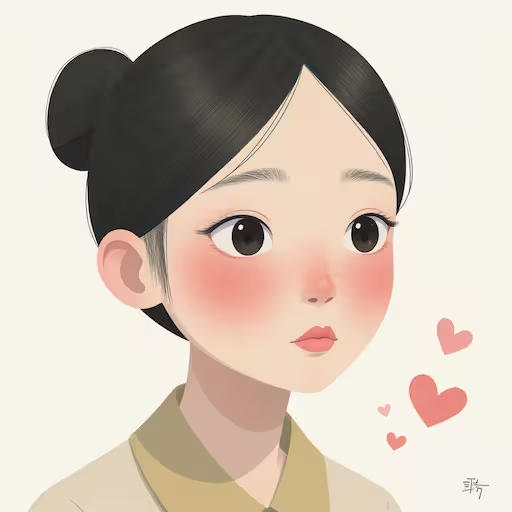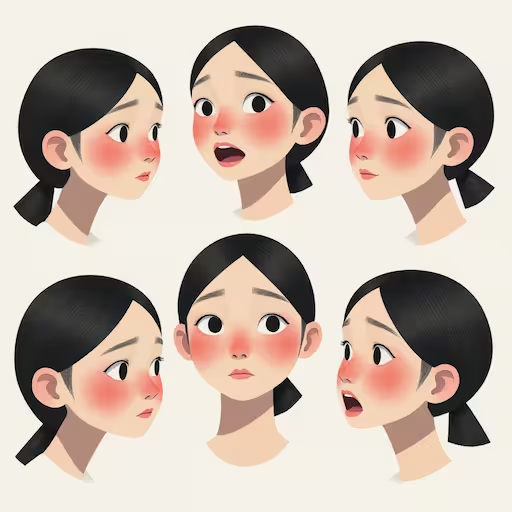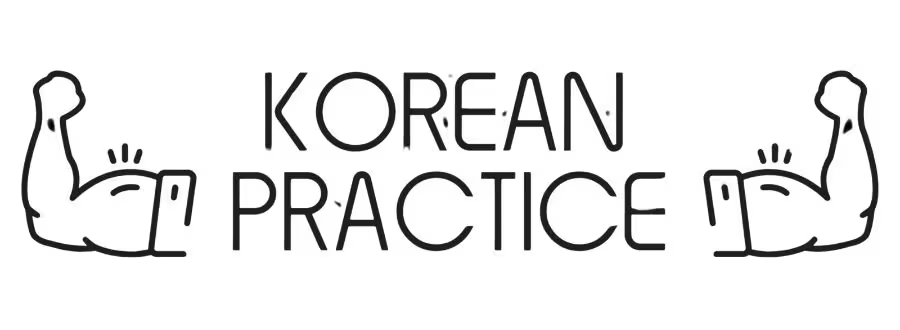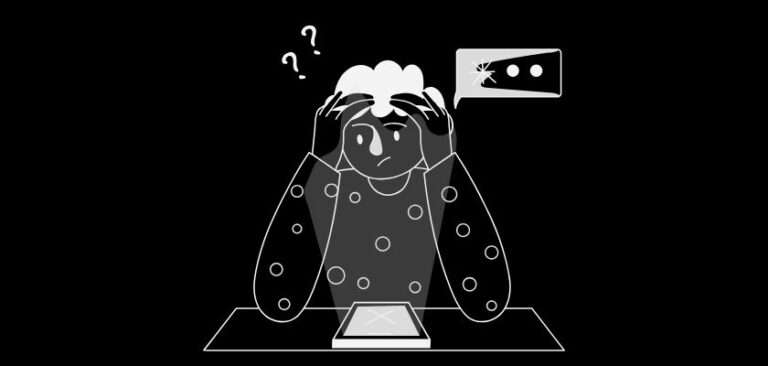If you want to express emotions naturally in Korean, start with core words like 기쁘다 (to feel happy), 슬프다 (to feel sad), 화나다 (to feel angry), and 불안하다 (to feel anxious). These essential verbs instantly help you describe how you feel in everyday conversations.

Want to go deeper?
Keep reading to explore 38 powerful Korean emotion words, simple examples, and useful phrases that will help you sound more natural and confident when expressing your feelings in Korean.
Follow These Steps
Step 1: Listen & Shadow
Follow the audio and speak along with the highlighted text.
Step 2: Check & Learn
Use the breakdowns to understand grammar, vocab, and meaning.
Go Deeper
STEP 1 Listen & Shadow
Click play and speak along with the highlighted text below
Table of Contents
STEP 2 Check & Learn
Useful Phrases for Expressing Emotions in Korean
Now that we’ve covered some tips for mastering emotions in Korean, let’s take a look at some useful phrases for expressing different emotions.
1. 기쁨 (Gi-ppeum)
In the realm of emotions in Korean, the word for happiness is “기쁨” (gi-ppeum). This cherished emotion, deeply ingrained in Korean culture, finds diverse expressions, ranging from a gentle smile to an exuberant outburst of joy. To effectively convey and embrace happiness within the context of “emotions in Korean,” you can tap into the following phrases:
기뻐요 (gi-bbeo-yo) – I’m happy
선물을 받아서 기뻐요.
선물을 (seon-mu-reul) 받아서 (ba-da-seo) 기뻐요 (gi-bbeo-yo).
선물 (gift) 을 (my object is a gift) 받 (to receive) 아서 (because) 기쁘 (to be happy) 어요 (am; I’m telling you polite and friendly). * 기쁘 + 어요 = 기뻐요
I’m happy because I received a gift.
Lit. (I)’m happy because (I) receive gift.
행복해요 (haeng-bo-kae-yo) – I’m so happy
오늘은 내 생일이라서 행복해요.
오늘은 (o-neu-reun) 내 (nae) 생일이라서 (saeng-i-ri-ra-seo) 행복해요 (haeng-bo-kae-yo).
오늘 (today) 은 (my topic is today) 내 (my) 생일 (birthday) 이라서 (because) 행복하 (to be so happy) 해요 (am; I’m telling you polite and friendly). * 하 -> 해
I’m so happy today because it’s my birthday.
Lit. (I)’m so happy because today is my birthday.
좋아해요 (jo-a-hae-yo) – I like it
저는 이 색깔을 좋아해요.
저는 (jeo-neun) 이 (i) 색깔을 (saek-gga-reul) 좋아해요 (jo-a-hae-yo).
저 (I; in a humble way) 는 (my topic is myself) 이 (this) 색깔 (color) 을 (my object is this color) 좋아하 (to like) 해요 (I’m telling you polite and friendly). * 하 -> 해
I like this color.
Still wondering how to read Korean?
즐거워요 (jeul-geo-wo-yo) – I’m enjoying myself
오늘 파티가 정말 즐거워요.
오늘 (o-neul) 파티가 (pa-ti-ga) 정말 (jeong-mal) 즐거워요 (jeul-geo-wo-yo).
오늘 (today) 파티 (party) 가 (my subject is party) 정말 (really) 즐겁 (to be fun) 어요 (am; I’m telling you polite and friendly). * 즐겁 + 어요 = 즐거워요
I’m really enjoying the party today.
Lit. Today party is really fun.
웃어요 (u-seo-yo) – I’m laughing
내 친구가 코미디 영화를 보면서 웃어요.
내 (nae) 친구가 (chin-gu-ga) 코미디 (ko-mi-di) 영화를 (yeong-hwa-reul) 보면서 (bo-myeon-seo) 웃어요 (u-seo-yo).
내 (my) 친구 (friend) 가 (my subject is my friend) 코미디 (comedy) 영화 (movie) 를 (my object is a comedy movie) 보 (to watch) 면서 (while) 웃 (to laugh) 어요 (I’m telling you polite and friendly).
My friend is laughing while watching a comedy movie.
Lit. My friend is laughing while watching a comedy movie.
만족해요 (man-jok-kae-yo) – I’m satisfied
이 음식은 맛있어서 만족해요.
이 (i) 음식은 (eum-si-geun) 맛있어서 (ma-si-sseo-seo) 만족해요 (man-jok-kae-yo).
이 (this) 음식 (food) 은 (my topic is this food) 맛있 (to be delicious) 어서 (because) 만족하 (to be satisfied) 해요 (am; I’m telling you polite and friendly).
I am satisfied because this food is delicious.
Lit. (I) am satisfied because this food is delicious.
I See in Korean: 3 Real Phrases Koreans Use (Not Just ‘그렇구나’!)
2. 슬픔 (Seul-peum)
Sadness, an emotion that transcends cultural boundaries, is an inherent part of the vast spectrum of emotions in Korean. In Korean, the word for sadness is “슬픔” (seul-peum). To navigate the realm of emotions in Korean, particularly when it comes to expressing sadness, you can rely on the following phrases:

슬퍼요 (seul-peo-yo) – I’m sad
이별해서 슬퍼요.
이별해서 (i-byeol-hae-seo) 슬퍼요 (seul-peo-yo).
이별하 (to break up) 해서 (because) 슬프 (to be sad) 어요 (am; I’m telling you polite and friendly). 하 -> 해, 슬프 + 어요 = 슬퍼요
I’m sad because of the breakup.
Lit. (I)’m sad because breakup.
우울해요 (u-ul-hae-yo) – I’m depressed
가족 문제 때문에 우울해.
가족 (ga-jok) 문제 (mun-je) 때문에 (ddae-mu-ne) 우울해요 (u-ul-hae).
가족 (family) 문제 (issue) 때문에 (because of) 우울하 (to be depressed) 해 (am; I’m telling you casually). * 하 -> 해
I’m depressed because of family issues.
Lit. (I)’m depressed because of family issue.
울어요 (u-reo-yo) – I’m crying
좋은 소식을 받자 그녀는 기뻐서 울었어요.
좋은 (jo-eun) 소식을 (so-si-geul) 받자 (bat-jja) 그녀는 (geu-nyeo-neun) 기뻐서 (gi-bbeo-seo) 울었어요 (u-reot-sseo-yo).
좋은 (good) 소식 (news) 을 (my object is the good news) 받 (to receive) 자 (when) 그녀 (she) 는 (my topic is she) 기쁘 (to be happy) 어서 (because) 울 (to cry) 었 (past tense) 어요 (I’m telling you polite and friendly). * 기쁘 + 어서 = 기뻐서
She cried tears of joy when she received the good news.
Lit. She cried because (she) is happy when (she) receive good news.
서러워요 (seo-reo-wo-yo) – I’m feeling mournful
슬픈 소식 때문에 서러워요.
슬픈 (seul-peun) 소식 (so-sik) 때문에 (ddae-mu-ne) 서러워요 (seo-reo-wo-yo).
슬픈 (sad) 소식 (news) 때문에 (because of) 서럽 (to feel mournful) 어요 (am; I’m telling you polite and friendly).
I’m feeling mournful because of the sad news.
Lit. (I)’m feeling mournful because of sad news.
울적해요 (ul-jjeok-kae-yo) – I’m feeling melancholy
슬픈 영화를 본 후에 울적해.
슬픈 (seul-peun) 영화를 (yeong-hwa-reul) 본 (bon) 후에 (hu-e) 울적해 (ul-jjeok-kae).
슬픈 (sad) 영화 (movie) 를 (my object is a sad movie) 보 (to watch) ㄴ 후에 (after) 울적하 (to feel melancholy) 해 (am; I’m telling you casually). 보 + ㄴ 후에 = 본 후에, 울적하 -> 울적해
After watching a sad movie, I’m feeling melancholy.
Lit. After watching sad movie, (I)’m feeling melancholy.
실망해요 (sil-mang-hae-yo) – I’m feeling disappointed
콘서트를 기대하고 있었는데 취소되어서 실망했어요.
콘서트를 (kon-seo-teu-reul) 기대하고 (gi-dae-ha-go) 있었는데 (it-sseon-neun-de) 취소되어서 (chwi-so-doe-eo-seo) 실망했어요 (sil-mang-haet-sseo-yo).
콘서트 (concert) 를 (my object is the concert) 기대하 (to look forward) 고 있 (~ing) 었 (past tense) 는데 (but) 취소되 (to get canceled) 어서 (because) 실망하 (to feel disappointed) ㅆ (past tense) 어요 (I’m tellilng you polite and friendly).
I was looking forward to the concert, but it got canceled. I’m feeling disappointed about the cancellation.
Lit. (I) was looking forward to concert, but because (it) get canceled (I)’m feeling disappointed.
쓸쓸해요 (sseul-sseul-hae-yo) – I’m feeling lonely
나는 쓸쓸해요. 누군가와 이야기하고 싶어요.
나는 (na-neun) 쓸쓸해요 (sseul-sseul-hae-yo). 누군가와 (nu-gun-ga-wa) 이야기하고 (i-ya-gi-ha-go) 싶어요 (si-peo-yo).
나 (I) 는 (I’m going to talk about me) 쓸쓸하 (to feel lonely) 해요 (am; I’m telling you polite and friendly). 누군가 (someone) 와 (with) 이야기하 (to talk) 고 싶 (want to) 어요 (I’m telling you polite and friendly).
I’m feeling lonely. I want to talk to someone.
Lit. I’m feeling lonely. (I) want to talk with someone.
By incorporating these phrases within the context of emotions in Korean, you can effectively express and convey your experience of sadness while embracing the cultural nuances associated with expressing emotions in Korean language.
Juseyo Meaning – What ‘주세요’ Means and How to Use It in Korean
3. 화남 (Hwa-nam)
When it comes to understanding of emotions in Korean, anger surfaces as a profound and multifaceted sentiment. Within the context of emotions in Korean, the word for anger is “화남” (hwa-nam). To authentically convey anger while encompassing the intricacies of emotions in Korean, you can use the following phrases:
화나요 (hwa-na-yo) – I’m angry
그 일 때문에 화나요.
그 (geu) 일 (il) 때문에 (ddae-mu-ne) 화나요 (hwa-na-yo).
그 (that) 일 (incident) 때문에 (because of) 화나 (to be angry) 아요 (am; I’m telling you polite and friendly). * 화나 + 아요 = 화나요
I’m angry because of that incident.
Lit. (I)’m angry because of that incident.
짜증나요 (jja-jeung-na-yo) – I’m annoyed
너무 소음이 심해서 짜증나요.
너무 (neo-mu) 소음이 (so-eu-mi) 심해서 (sim-hae-seo) 짜증나요 (jja-jeung-na-yo).
너무 (too) 소음 (noise) 이 (my subject is noise) 심하 (to be severe) 해서 (because) 짜증나 (to be annoyed) 아요 (am; I’m telling you polite and friendly). 하 -> 해, 짜증나 + 아요 = 짜증나요
I’m annoyed because noise is so loud.
Lit. (I)’m annoyed because noise is too severe.
불쾌해요 (bul-kwae-hae-yo) – I feel unpleasant
그 사람과 대화하면 불쾌해요.
그 (geu) 사람과 (sa-ram-gwa) 대화하면 (dae-hwa-ha-myeon) 불쾌해요 (bul-kwae-hae-yo).
그 (that) 사람 (person) 과 (with) 대화하 (to talk) 면 (if) 불쾌하 (to feel unpleasant) 해요 (I’m telling you polite and friendly).
I feel unpleasant when I talk to that person.
Lit. (I) feel unpleasant if (I) talk with that person.
화내요 (hwa-nae-yo) – I get enraged (to express anger)
화내지 말고 진정해요.
화내지 (hwa-nae-ji) 말고 (mal-go) 진정해요 (jin-jeong-hae-yo).
화내 (to get enraged) 지 말 (don’t) 고 (and) 진정하 (to calm down) 해요 (I suggest you).
Don’t get enraged and try to calm down.
Lit. Don’t get enraged and calm down.
억울해요 (eo-gul-hae-yo) – to feel unfairly treated
열심히 일했는데 인정받지 못해서 억울해요.
열심히 (yeol-sim-hi) 일했는데 (il-haet-neun-de) 인정받지 (in-jeong-bat-ji) 못해서 (mot-tae-seo) 억울해요 (eo-gul-hae-yo).
열심히 (hard) 일하 (to work) 했 (past tense) 는데 (so; I’m in that situation) 인정받 (to be recognized) 지 못하 (can not) 해서 (because) 억울하 (to feel unfair) 해요 (is; I’m telling you polite and friendly). 일하 -> 일해, 못하 -> 못해, * 억울하 -> 억울해,
I worked really hard, so it’s unfair that I didn’t get recognized.
LIt. (I) worked hard, so (it)’s unfair because (I) can not be recognized.
By incorporating these phrases within the context of emotions in Korean, you can effectively convey and communicate the nuanced experience of anger, embracing the cultural dynamics inherent to expressing emotions in Korean language.
Want the easiest way to understand and speak Korean?
My courses include:
→ Story lessons with MORE powerful breakdowns
→ Speaking, dictation & shadowing practice + much more
→ Interactive quizzes
🎁 7-day trial included with subscription
4. 불안 (Bu-ran)
When delving into the intricate landscape of emotions in Korean, anxiety emerges as a prevalent and recurring sentiment that countless individuals encounter. Within the realm of Korean emotions, the word for anxiety is “불안” (bu-ran). To effectively convey and encompass the essence of anxiety within the context of emotions in Korean, you can utilize the following phrases:
걱정돼요 (geok-jeong-dwae-yo) – I’m worried
걱정돼요. 내일의 날씨가 좋지 않을 것 같아요.
걱정돼요 (geok-jeong-dwae-yo). 내일의 (nae-i-re) 날씨가 (nal-ssi-ga) 좋지 (jot-chi) 않을 (a-neul) 것 (ggeot) 같아요 (ga-ta-yo).
걱정되 (to be worried) 어요 (am; I’m telling you polite and friendly). 내일 (tomorrow) 의 (‘s) 날씨 (weather) 가 (my subject is tomorrow’s weather) 좋 (to be good) 지 않 (not) 을 것 같 (I am guessing in a weak and soft way about the future or something that is likely to happen) 아요 (I’m telling you polite and friendly).
I’m worried. It seems like tomorrow’s weather won’t be good.
Lit. (I)’m worried. (It) seems like tomorrow’s weather won’t be good.
불안해요 (bu-ran-hae-yo) – I’m anxious
오늘이 시험이라서 불안해.
오늘이 (o-neu-ri) 시험이라서 (si-heo-mi-ra-seo) 불안해 (bu-ran-hae).
오늘 (today) 이 (I’m going to talk about today) 시험 (exam) 이라서 (because) 불안하 (to be anxious) 해 (am; I’m telling you casually). ” 하 -> 해
I’m anxious because of the exam today.
Lit. (I)’m anxious because today is exam.
무서워요 (mu-seo-wo-yo) – I’m scared
어둠 속에 혼자 있으면 항상 무서워요.
어둠 (eo-dum) 속에 (so-ge) 혼자 (hon-ja) 있으면 (it-sseu-myeon) 항상 (hang-sang) 무서워요 (mu-seo-wo-yo).
어둠 (dark) 속 (inside) 에 (in) 혼자 (alone) 있 (to be) 으면 (if) 항상 (always) 무섭 (to be scared) 워요 (am; I’m telling you polite and friendly).
If I’m alone in the dark, I’m always scared.
Lit. If (I)’m alone in inside dark, (I)’m always scared.
긴장돼요 (gin-jang-dwe-yo) – I’m nervous
오늘 면접이 있어서 긴장돼요.
오늘 (o-neul) 면접이 (myeon-jeo-bi) 있어서 (it-sseo-seo) 긴장돼요 (gin-jang-dwe-yo).
오늘 (today) 면접 (interview) 이 (my subject is an interview) 있 (to have) 어서 (because) 긴장되 (to be nervous) 어요 (am; I’m tellng you polite and friendly). * 긴장되 + 어요 = 긴장돼요
I’m nervous because I have an interview today.
Lit. (I)’m nervous because (I) have interview today.
떨려요 (ddeol-lyeo-yo) – I’m trembling
불안한 소식을 듣고 떨려요.
불안한 (bu-ran-han) 소식을 (so-si-geul) 듣고 (deut-ggo) 떨려요 (ddeol-ryeo-yo).
불안한 (unsettling) 소식 (news) 을 (my object is unsettling news) 듣 (to hear) 고 (after) 떨리 (to tremble) 어요 (am; I’m telling you polite and friendly).
I’m trembling after hearing unsettling news.
Lit. (I)’m trembling after hearing unsettling news.
초조해요 (cho-jo-hae-yo) – I feel uneasy
시간이 없어서 초조해요.
시간이 (si-ga-ni) 없어서 (eop-sseo-seo) 초조해요 (cho-jo-hae-yo).
시간 (time) 이 (my subject is time) 없 (there is no) 어서 (because) 초조하 (to feel uneasy) 해요 (I’m telling you polite and friendly).
I feel uneasy because there’s not enough time.
LIt. (I) feel uneasy because there’s no time.
겁나요 (geop-na-yo) – I feel scared
공포 영화를 보면 겁나요.
공포 (gong-po) 영화를 (yeong-hwa-reul) 보면 (bo-myeon) 겁나요 (geop-na-yo).
공포 (horror) 영화 (movie) 를 (my object is horror movies) 보 (to watch) 면 (if) 겁나 (to feel scared) 아요 (I’m telling you polite and friendly). * 겁나 + 아요 = 겁나요
I feel scared when I watch horror movies.
Lit. (I) feel scared if (I) watch horror movie.
답답해요 (dap-dap-hae-yo) – I feel frustrated
제 생각을 잘 표현하지 못해서 답답해요.
제 (je) 생각을 (saeng-ga-geul) 잘 (jal) 표현하지 (pyo-hyeon-ha-ji) 못해서 (mot-tae-seo) 답답해요 (dap-dap-hae-yo).
제 (my; in a humble way) 생각 (thoughts) 을 (my object is my thoughts) 잘 (well) 표현하 (to express) 지 못하 (can not) 해서 (because) 답답하 (to feel frustrated) 해요 (I’m tellling you polite and friendly). * 하 -> 해
I feel frustrated because I can’t express my thoughts well.
LIt. (I) feel frustrated because (I) can’t express my thoughts well.
By incorporating these phrases while considering the essence of emotions in Korean, you can aptly express and communicate the intricacies of anxiety, capturing the cultural nuances associated with expressing emotions in Korean language.
23 Empowering Directions in Korean! You’ll never be lost with me.
5. 사랑 (Sa-rang)
Love is perhaps the most powerful emotion that we can experience as humans. In emotions in Korean, the word for love is “사랑” (sa-rang). To express love in Korean, you can use the following phrases:
사랑해요 (sa-rang-hae-yo) – I love you
사랑해, 넌 내게 특별한 사람이야.
사랑해 (sa-rang-hae), 넌 (neon) 내게 (nae-ge) 특별한 (teuk-byeol-han) 사람이야 (sa-ra-mi-ya).
사랑하 (to love) 해 (I’m telling you casually), 너 (you) ㄴ (my topic is you) 내게 (to me) 특별한 (special) 사람 (person) 이야 (are; I’m telling you casually). 하 -> 해, 너 + ㄴ = 넌
I love you, you are a special person to me.
Lit. (I) love (you), you are special person to me.
사랑에 빠졌어요 (sa-rang-e bba-jyeo-sseo-yo) – I’ve fallen in love
이런 감정은 처음이에요. 사랑에 빠졌어요.
이런 (i-reon) 감정은 (gam-jeong-eun) 처음이에요 (cheo-eu-mi-e-yo). 사랑에 (sa-rang-e) 빠졌어요 (bba-jyeot-sseo-yo).
이런 (like this) 감정 (feeling) 은 (my topic is this feeling) 처음 (first) 이에요 (is; I’m telling you polite and friendly). 사랑 (love) 에 (in) 빠지 (to fall) 었 (past tense) 어요 (I’m telling you polite and friendly).
This feeling is new to me. I’ve fallen in love.
Lit. Feeling like this is first. (I)’ve fallen in love.
42 Essential Korean Phrases for Travel
6. 감사 (Gam-sa)
Gratitude is an important emotion that allows us to appreciate the good things in life. In emotions in Korean, the word for gratitude is “감사” (gam-sa). To express gratitude in Korean, you can use the following phrases:
고마워요 (go-ma-wo-yo) – Thank you
선물을 줘서 고마워요.
선물을 (seon-mu-reul) 줘서 (jwo-seo) 고마워요 (go-ma-wo-yo).
선물 (gift) 을 (my object is the gift) 주 (to give) 어서 (because) 고마워요 (thank you; in a polite and friendly way).
Thank you for the gift.
Lit. Thank you because (you) give (me) gift.
감사합니다 (gam-sa-ham-ni-da) – Thank you
대단히 감사합니다.
대단히 (dae-da-ni) 감사합니다 (gam-sa-ham-ni-da).
대단히 (very) 감사하 (to be grateful) ㅂ니다 (I’m telling you polite and formal manner).
Thank you so much.
16 Essential Korean Phrases for Restaurants: Grammar Made Easy!
7. 놀람 (Nol-lam)
Surprise is an emotion that can be both positive and negative, depending on the situation. In emotions in Korean, the word for surprise is “놀람” (nol-lam). To express surprise in Korean, you can use the following phrases:
놀랐어요 (nol-lat-sseo-yo) – I was surprised
아침에 눈이 내렸을 때, 놀랐어요.
아침에 (a-chi-me) 눈이 (nu-ni) 내렸을 (nae-ryeot-sseul) 때 (ddae), 놀랐어요 (nol-rat-sseo-yo).
아침 (morning) 에 (in) 눈 (snow) 이 (my subject is snow) 내리 (to fall) 었 (past tense) 을 때 (when), 놀라 (to be surprised) 았 (past tense) 어요 (I’m telling you polite and friendly). 내리 + 었 = 내렸, 놀라 + 았 = 놀랐
I was surprised when it snowed in the morning.
Lit. (I) was surprised when snow fell in morning.
의외였어요 (ui-oe-yeot-sseo-yo) – It was unexpected
그 이야기의 결말은 모두에게 의외였어요.
그 (geu) 이야기의 (i-ya-gi-e) 결말은 (gyeol-ma-reun) 모두에게 (mo-du-e-ge) 의외였어요 (ui-oe-yeot-sseo-yo).
그 (that) 이야기 (story) 의 (of) 결말 (ending) 은 (my topic is the ending) 모두 (everyone) 에게 (to) 의외 (unexpectation) 였 (past tense) 어요 (I’m telling you polite and friendly).
The ending of that story was unexpected for everyone.
Lit. Ending of that story was unexpectation to everyone.
10 Must-Know Korean Phone Conversations Phrases (+Simple Breakdowns)
8. 기대 (Gi-dae)
Anticipation is an emotion that can be both exciting and nerve-wracking. In emotions in Korean, the word for anticipation is “기대” (gi-dae). To express anticipation in Korean, you can use the following phrases:
기대돼요 (Gi-dae-dwae-yo) – I’m looking forward to it
내일 여행이 기대돼요. 새로운 장소를 탐험할 수 있을 거 같아요.
내일 (nae-il) 여행이 (yeo-haeng-i) 기대돼요 (gi-dae-dwae-yo). 새로운 (sae-ro-un) 장소를 (jang-so-reul) 탐험할 (tam-heom-hal) 수 (ssu) 있을 (it-sseul) 거 (ggeo) 같아요 (ga-ta-yo).
내일 (tomorrow) 여행 (trip) 이 (my subject is trip) 기대되 (to be looking forward to it) 어요 (am; I’m telling you polite and friendly). 새로운 (new) 장소 (place) 를 (my object is new places) 탐험하 (to explore) ㄹ 수 있 (to be able to) 을 거 같 (I am guessing in a weak and soft way about the future or something that is likely to happen) 아요 (I’m telling you polite and friendly).
I’m looking forward to tomorrow’s trip. I think I’ll be able to explore new places.
Lit. (I)’m looking forward to tomorrow trip. I think I’ll be able to explore new place.
설레요 (seol-le-yo) – I’m excited
내 생일 파티가 다가오니까 설레요.
내 (nae) 생일 (saeng-il) 파티가 (pa-ti-ga) 다가오니까 (da-ga-o-ni-gga) 설레요 (seol-le-yo).
내 (my) 생일 (birthday) 파티 (party) 가 (my subject is my birthday party) 다가오 (to approach) 니까 (as) 설레 (to be excited) 어요 (am; I’m telling you polite and friendly). * 설레 + 어요 = 설레요
I’m excited as my birthday party is approaching.
Lit. (I)’m excited as my birthday party approach.
8. 당황 (Dang-hwang)
“Dang-hwang” (당황), one of the prominent emotions in Korean, refers to the feeling of being flustered, bewildered, or taken aback in a situation. It is an intriguing aspect of emotions in Korean culture that encompasses a unique blend of embarrassment, awkwardness, or discomfort caused by unexpected or unfamiliar circumstances.
When someone experiences this particular emotion, known as “당황,” they may find themselves in a state of confusion or a loss of composure, unsure of how to appropriately react or respond. This emotional state highlights the complexity and richness of emotions in Korean culture, as it mirrors the sensation of feeling caught off guard or put on the spot, evoking a temporary sense of unease and embarrassment.
당황스러워요 (dang-hwang-seu-reo-wo-yo) – I feel embarrassed
그 상황에 당황스러워서 말이 안 나와요.
그 (geu) 상황에 (sang-hwang-e) 당황스러워서 (dang-hwang-seu-reo-wo-seo) 말이 (ma-ri) 안 (an) 나와요 (na-wa-yo).
그 (that) 상황 (situation) 에 (in) 당황스럽 (to feel embarrassed) 어서 (because) 말 (words) 이 (my subject is words) 안 (not) 나오 (to come out) 아요 (I’m telling you polite and friendly). 당황스럽 + 어서 = 당황스러워서, 나오 + 아요 = 나와요
I feel embarrassed in that situation, and I can’t find the words.
Lit. Because (I) feel embarrassed in that situation, words does not come out (of my mouth).
부끄러워요 (bu-ggeu-reo-wo-yo) – I feel ashamed
제 실수 때문에 부끄러워요.
제 (je) 실수 (sil-su) 때문에 (ddae-mu-ne) 부끄러워요 (bu-ggeu-reo-wo-yo).
제 (my; in a humble way) 실수 (mistake) 때문에 (because of) 부끄럽 (to feel ashamed) 어요 (I’m telling you polite and friendly). * 부끄럽 + 어요 = 부끄러워요
I feel ashamed because of my mistake.
Lit. (I) feel ashamed because of my mistake.
어색해요 (eo-saek-kae-yo) – I feel awkward
처음 보는 사람들과 어색해요.
처음 (cheo-eum) 보는 (bo-neun) 사람들과 (sa-ram-deul-gwa) 어색해요 (eo-saek-kae-yo).
처음 (for the first time) 보 (to see) 는 (whom) 사람들 (people) 과 (with) 어색하 (to feel awkward) 해요 (I’m telling you polite and friendly).
I feel awkward with people I meet for the first time.
LIt. (I) feel awkward with people whom (I) see for the first time.
창피해요 (chang-pi-hae-yo) – I feel ashamed
제 행동 때문에 창피해요, 깊이 후회하고 있어요.
제 (je) 행동 (haeng-dong) 때문에 (ddae-mu-ne) 창피해요 (chang-pi-hae-yo), 깊이 (gi-pi) 후회하고 (hu-hoe-ha-go) 있어요 (i-sseo-yo).
제 (my; in a humble way) 행동 (action) 때문에 (because of) 창피하 (to feel ashamed) 해요 (I’m telling you polite and friendly), 깊이 (deeply) 후회하 (to regret) 고 있 (~ing) 어요 (I’m telling you polite and friendly).
I feel ashamed of my actions, and I deeply regret them.
Lit. (I) feel ashamed because of my action, (I) deeply am regreting (them).
10 Heartfelt Ways to Say Goodbye in Korean: Fully Explained
FAQs (What You Might Still Wonder About)
How do Koreans express happiness differently from English speakers?
When learning happy in Korean, it helps to know that Koreans often express happiness indirectly through tone or context rather than only saying “기뻐요.” For example, phrases like “좋네요!” or “완전 좋아!” can sound more natural in daily conversation.
Are there cultural differences in how people express feelings in Korean?
Yes. Many Koreans soften their emotions to maintain harmony. Instead of directly expressing anger or sadness, they may use gentle Korean phrases for emotions such as “좀 속상해요” (I’m a bit upset) to avoid sounding too strong.
What’s the easiest way to learn Korean emotion words without memorizing long lists?
Group the vocabulary by feelings—positive, negative, or subtle emotions. This helps your brain build connections, making Korean emotion words easier to remember and use naturally.
Why do some Korean feeling words have multiple meanings?
In Korean, context determines meaning. For example, 부끄럽다 can mean embarrassed, shy, or even bashful, depending on the situation. This flexibility is common in feelings in Korean, so look at the whole sentence rather than translating word by word.
What is the difference between emotions and moods in Korean?
Emotions (감정) describe immediate reactions like anger or happiness, while moods (기분) describe a long-lasting state. That’s why you say 기분이 좋아요 (I’m in a good mood) instead of 감정이 좋아요.
Why do Koreans often add sound effects when expressing emotions?
In Korean conversation, emotional sound expressions like 헐, 아싸, 아이구, or 에이 often carry more emotional weight than full sentences. These add nuance and help express subtle feelings in Korean that might not translate directly into English.
Final words
In conclusion, mastering emotions in Korean is an essential part of effective communication. By understanding cultural differences, learning emotional vocabulary, and using the right tone and body language, you can effectively express a wide range of emotions in Korean. With the phrases we’ve provided, you’ll be well on your way to expressing.







